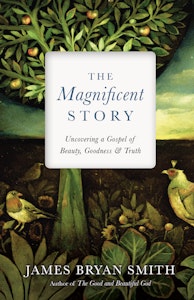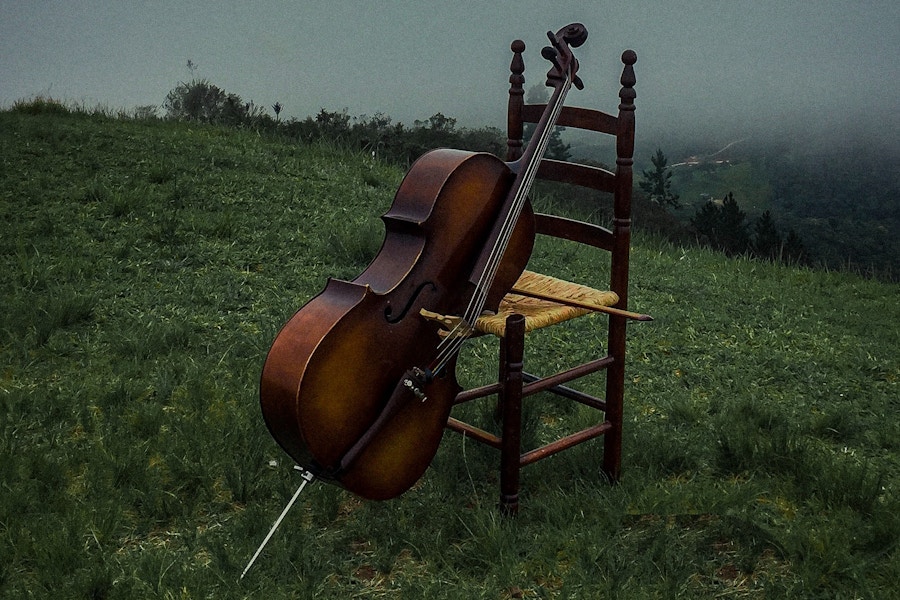 Excerpt from The Magnificent Story
Excerpt from The Magnificent Story
I met a man who watches The Lord of the Rings movies every night. When he told me this I pushed back, “Every night?” He said when he gets off work he goes home, fixes his dinner, and turns on the movie and watches until he gets sleepy. He stops the movie, and resumes in the same spot the next night. I was stunned by this, but in a way I understand. Great stories filled with adventure, with an epic battle of good versus evil, where tragedy ends in triumph, do something to our soul nothing else can.
We are creatures with a mystery in our heart that is bigger than ourselves. We may think we can find ultimate pleasure, satisfaction, and meaning in alcohol, sex, money, or power, but in reality those have never satisfied anyone. They are too small for our massive souls. We were designed to take part in a divine drama, an epic story. We were made not merely to hear it but to be in it. We are, indeed, stories. But in truth we are not the protagonist of the real story, the story we long to take part in. God is the hero of the only story that will satisfy us.
The thesis of this book is that there is a magnificent story, which is the most important thing happening on this earth. It is our only hope as individuals, communities, countries, and a species. But for a variety of reasons the gospel message we often hear, the story often told, is shrunken and distorted. This is why we see so many frustrated, disappointed Christians. It is not that they are bad people, but they have never heard the magnificent story in its fullness.
The good news of the gospel is similar to crying over the beauty of heavenly music. The good news of the gospel is similar to feeling glad when we see someone perform an unexpected act of kindness for a stranger. The greatest news is that this is what God is like.
To discover this we need to look at the story — the gospel — through the lenses of beauty, goodness, and truth.
My friend Trevor stated it well: “In order to see beauty, goodness, and truth, I have to have humble eyes.” Our eyes can be humble only when we get ourselves out of the way and focus on the beauty all around us. And we see God best when we learn to see and experience beauty, goodness, and truth. When we see them, we get a glimpse of God. We not only see them, we hear them, we smell them, we touch them, and we taste them. God gave us all of our senses — physical and spiritual — to feel God’s love.
God sings his love to you in birdsong. God smiles at you in maple trees. God charms you with the color green. He gave you eyes to see sunsets, ears to hear rainfall, a nose to smell a rose. God’s massive love appears in the small fragments. God is loving you in these moments, even if you don’t know it.
Beauty And Suffering: The Cellist Of Sarajevo
From 1992 to 1995 the world witnessed one of the worst civil conflicts, the Bosnian War. Three factions, each tied to a religion (Orthodox Serbs, Catholic Croats, and Muslim Bosniaks), began attacking one another in a struggle for power after the breakup of Yugoslavia. The Serbs, backed by the Yugoslavian army, attacked the Croats and Bosniaks, but the latter two united and fought back. In the end no one was innocent of the bloodshed. Over 100,000 people were killed, 2.2 million people were displaced, and it is estimated that over 12,000 women — mostly Muslim — were raped.
In the midst of the ugliness and the suffering, beauty emerged to offer a different story. As the mortar shells rained down on Sarajevo, a musician from Bosnia and Herzegovina named Vedran Smailović did the only thing he knew to do: he played his cello. In the midst of the destruction of buildings and the killing of his family and friends, Vedran played his cello — in full formal attire — alone in the ruins and in the streets, even though there was relentless sniper fire.
During the conflict no one knew when or where he would play, but as soon as someone heard him playing, the crowds grew. Grieving and starving, the people gathered to listen. Why? As Smailović said, “They were hungry, but they still had soul.” In the midst of tragedy, his music echoed from another world, a place where beauty, goodness, and truth reside. Through Smailović — an instrument of God, I believe — the people found hope and healing.
As he played his cello in the ruined city during the forty-four-month siege, Smailović inspired people around the world. Singer Joan Baez sat in solidarity with him as he played on the streets. Composer David Wilde wrote a piece for cello in his honor: “The Cellist of Sarajevo,” played by Yo-Yo Ma. Smailović became a symbol of how beauty stands in resistance to the madness of war. Aleksandr Solzhenitsyn, in a speech he gave after winning the Nobel Prize, said, “If the too obvious, too straight branches of Truth and Good are crushed or amputated and cannot reach the light — yet perhaps the … unexpected branches of Beauty will make their way through and soar up to that very place and in this way perform the work of all three.” Perhaps Dostoevsky was right when he said, “Beauty will save the world.”
What is at Stake?
Our world is in search of a magnificent story. Many people are hungering for something that will provide answers to their deepest longings… No one wants to live a lame life, yet it seems many people are doing just that, including Christians. Our magnificent story has been reduced, shrunken into a tame, manageable story failing to create magnificent lives.
We need a vision. We need the true Christian story.
Related Podcast
Excerpted from “Longing for a Magnificent Story,” The Magnificent Story by James Bryan Smith (Downers Grove, IL: Intervarsity Press, 2017).
Photo by Janderson Tulio on Unsplash
Text First Published September 2017


